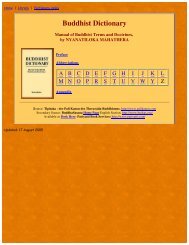The Three Basic Facts of Existence II: Suffering (Dukkha) - Buddhist ...
The Three Basic Facts of Existence II: Suffering (Dukkha) - Buddhist ...
The Three Basic Facts of Existence II: Suffering (Dukkha) - Buddhist ...
- No tags were found...
You also want an ePaper? Increase the reach of your titles
YUMPU automatically turns print PDFs into web optimized ePapers that Google loves.
entertainers and the hysterics <strong>of</strong> the juvenile crowds in the balls are only equalled by theirparents in the clubs or around the sports arenas.It is told <strong>of</strong> the Buddha that he likened mankind to fish in a fast drying pool, whose franticstruggles to escape only churned up the mud and choked them. “What he would have thought<strong>of</strong> modern society is beyond words! Where in this picture can you find “faith and virtue,wisdom, generosity and lore?”In her introduction to the Sigâlovâda Sutta, Mrs. C.A.F. Rhys-Davids intersperses her comment withquotations from Buddhaghosa, who wrote in the 5 th century AD, and has this to say <strong>of</strong> the code <strong>of</strong>ethics for the layman as therein set out:“<strong>The</strong> Buddha’s doctrine <strong>of</strong> love and goodwill between man and man is here set forth in asystem <strong>of</strong> domestic and social ethics with more comprehensive detail than elsewhere.Nothing in the duties <strong>of</strong> housemen is left unmentioned. So fundamental are the humaninterests involved, so sane and wide is the wisdom that envisages them, that the utterancesare as fresh and practically as binding today and here as they were then at Râjagaha. Happywould have been the village or the clan on the banks <strong>of</strong> the Ganges, where the people were full <strong>of</strong>the kindly spirit <strong>of</strong> fellow feeling, the noble spirit <strong>of</strong> justice, which breathes through these naive andsimple sayings. Not less happy would be the village or family on the banks <strong>of</strong> the Thames <strong>of</strong>which this could be said.”And to up-date Mrs. Rhys-Davids, the same applies to any city, town or village on river, shore,or hinterland in 1967.To find a solution to any problem it is first necessary to understand the problem itself. Whythen, or how, has man so degenerated “spiritually” (for want <strong>of</strong> a better word) when he hasmade such phenomenal strides scientifically?Until two centuries ago, much <strong>of</strong> the world beyond the Euro-Asian continents and theMediterranean fringe <strong>of</strong> Africa was comparatively unknown territory, and the aboriginalpopulation <strong>of</strong> the Americas, Australia, Oceania, and most <strong>of</strong> Africa, were primitive peoplesfinding food, clothing, and shelter by local hunting or agriculture. Today every last mile <strong>of</strong> thecontinents, and island <strong>of</strong> the oceans, has been brought within the ambit <strong>of</strong> so-called civilization,and willy-nilly tied to the “wheels <strong>of</strong> progress” with their accompanying evils.“How can progress be evil?” you may ask, and the fact that the question is raised indicatesthat “lopsided thinking” to which we have referred.<strong>The</strong> Indians <strong>of</strong> South, Central, and North America today are less happy as “second-classcitizens” than were their ancestors. <strong>The</strong> aborigines <strong>of</strong> Australia are struggling for recognition as“people,” and still lack the amenities <strong>of</strong> full citizenship. <strong>The</strong> inhabitants <strong>of</strong> the South Seas havelittle to thank the white man for when compared with the introduced epidemics and disease hebrought them. Africa is in turmoil as the natives strive to emulate the “processes <strong>of</strong> civilization,”and determine right by might. Tibet is being “liberated” from feudalism and “civilised” bybloodshed and oppression. This is the “progress” <strong>of</strong> which we are so proud!<strong>The</strong> great incentive in life is the search for happiness at whatever level <strong>of</strong> development manmay stand. All religions, all political ideologies, all avenues <strong>of</strong> sensual pleasures, are based onsatisfying that search. <strong>The</strong> hope <strong>of</strong> Heaven, Paradise, Sukhavati or Nibbâna is to escape fromsuffering and find final happiness with its cessation.In politics, one ideology sees happiness in freedom from want under state ownership, andcontrol <strong>of</strong> the distribution <strong>of</strong> commodities. Another sees happiness in free enterprise, and agovernment <strong>of</strong> the people, by the people, for the people. Unfortunately, both fail in two ways.First, it is impossible to regiment personal thinking as apart from action, with the result that in37
















